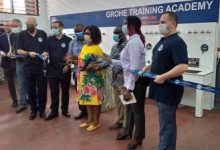
The third wave of the COVID-19 Households and Job Tracker conducted by the Ghana Statistical Service has revealed that majority of households are yet to recover from the shock of the pandemic.
Data for the exercise was collected in the first two weeks of December 2021 and all the answers are self-reported.
It said two thirds (68.3 per cent) surveyed said their income had not been recovered to pre-pandemic levels.
According to the survey only 26.7 per cent of respondents indicated that their total household income stayed the same as compared to the period before COVID-19 (March 16, 2020).
It said 5.1 per cent of respondents indicated that their total income increased.
The survey revealed that most households resorted to borrowing in the heat of the pandemic to eke out the living.
“The survey identified that approximately 86.7 per cent of households used some sort of coping strategy to deal with the negative effects of COVID-19 since March 2020,” the survey revealed.
It said the most common coping strategies included relying on savings (43.0 per cent) and reducing food consumption (42.9 per cent).
The survey revealed that households spent GH12 on Personal Protection Equipment (PPEs) per week on average.
“The median expenditure on PPEs (masks, sanitisers, face shields per household on the seven days before the interviews was 12.0 and the mean expenditure 22.0. Median expenditure was slightly higher in urban areas (14) than in rural areas (10.3),” the survey, said.
It said of the zones, both the median (15) and mean (25.3) expenditure was the highest in the coastal zone, while 68.2% indicated that their household income decreased, adding that different sources of income, non-farm family business income saw the biggest reduction.
The survey said 77.3 per cent of households with income derived from a non-farm family business saw a decrease in income and only 4.4 per cent reported an increase in income.
The 4.2 per cent of households who got income from pension saw the smallest change of this income source. 76.7 per cent however reported no change in pension income, 13.0 per cent, a reduction and 10.3 per cent an increase.
It said 73.4 per cent indicated that they experienced an increase in the price of major food items consumed and 46.5 per cent indicated that they were affected by the increase of the price of inputs.
The survey revealed that 58.7 per cent o of households indicated that they were affected by the school closures, but the majority (92.1 per cent) of households indicated that this shock occurred in 2020.
It said for the purpose of the survey the regions had been combined in geographical zones. Western, Central, Greater Accra, and the Volta Region into the Coastal zone, Eastern, Ashanti, Ahafo, Western North, Bono, Bono East, and Oti Region into the Forest zone and Northern, North East, Upper West, Upper East, and Savannah Region into the Savannah zone.
BY KINGSLEY ASARE







